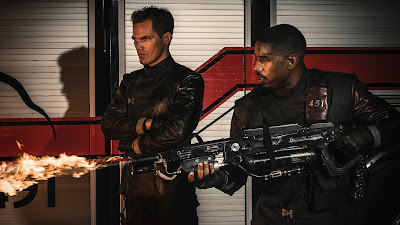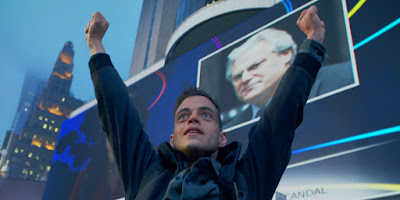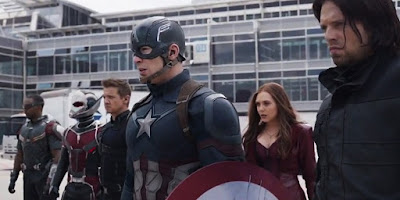Movie Review: Fahrenheit 451 (2018)
In a world where memorable book adaptations have become somewhat of a rarity in many major films today, limited mostly to the occasion teen romance or dystopian escapade, there emerged Fahrenheit 451. A modern take on the 1953 classic by author Ray Bradbury, the latest project from indie filmmaker Ramin Bahrani found its spark in exploited the social-media-crazed society of now, and tilting the novel's premise to reflect a new age of censorship and secrecy. While not entirely as profound or incendiary as it surely could've been, HBO's worthy adaptation ignited a compelling story, teeming with radiant performances.
In the not-so-distant future, books and other media of the past have been banned. With the air polluted with the thick smoke of burning books, the notions of free will and knowledge have become nearly extinct. Firemen, who once put out flames, now ignite them, turning them towards the dangerous material world they deem corrupt. One such fireman, Guy Montag (Michael B. Jordan), follows strictly behind the orders of his subordinate Captain Beatty (Michael Shannon) and has matured into one of the finest there is at what he does. Each harboring their own secrets of the past, however, the order the two men seek to maintain within the flames cannot last. After Montag is exposed to the influence of books, with the help of a surprising ally (Sofia Boutella), his once-unnerved allegiance to his cause and his master is tested. Revolution sparks as Montag rallies against the society he knows, seeking to uncover a new one from the ashes.
When it was announced that Ray Bradbury's sensational novel would grace the screen once more, following a number of previous adaptations like the 1966 film to a 1984 interactive video game, I was intriguing not only to see how the novel's premise would age in the 21st century, but also where the film might lie in the ranks of recent book-to-film adaptations. With a phenomenal cast in two of the most promising actors in Hollywood today, and a bleak, neon-tinted visual backdrop, Fahrenheit 451 had the look of a searing and dynamic update of Bradbury's McCarthy era dystopia. The big question remained, however -- does the media-driven portrait of society from 1953 still hold up today?
Despite the film's apparent hesitation to go the full distant with the topical edge of its source material, which sought to critique the influence of mass media on the traditional mediums (explicitly, literature), Fahrenheit 451 still managed to scrape the very surface of the ideals Bradbury explored. Easily fetishizing the burning of books and other physical means of knowledge and escapism in its opening credits, the film didn't spend too much time trying to be subtle. Opting to exploit the role of social media in its dystopia, it became very clear what direction this modern adaptation aimed to pursue. As it delved further into its premise of elite firemen torching literature and other such media in effort to create a new order, however, the film never elevated its potential to match the cultural assertions of the Bradbury's novel.
While its plot scuttled along steadily, introducing various circumstances that escalated its protagonist Montag's opposition to the society around him, the cast of the film remained one of my main draws to the HBO adaptation. As Michael B. Jordan led the show to mild acclaim as fireman-turned-insurgent Montag, a slithering Michael Shannon held up the rear as Montag's head-strong subordinate Captain Beatty. While it was surely entertaining to see two of my favorite actors currently duke it out on-screen, spewing countless cryptic literary quotes at one another, beyond the two the cast of the film fell short. Still, while there were few minor characters to follow along into the intriguing dystopia introduced, the chemistry between Jordan and Shannon managed to rescue most of the film when its storyline began to lag.
Overall, while HBO's Fahrenheit 451 sought to revive a classic tale of bold revolution amidst a corrupt, and visually-stunning, futuristic society, its notability ran thin beyond its charismatic cast and seedy, neon-tinted atmospherics. While Ray Bradbury's divisive novel was surely at the heart of the film, the adaptation never felt confident enough to go beyond the bare minimum of its radical future. While I'll give the film props for giving the reins to an independent director still shaping out his cinematic style, Fahrenheit 451 remained a underwhelming endeavor to showcase a startling dystopia that could very well become a reality.
I gave Fahrenheit 451 a 5 out of 10 for its mildly-enthralling premise anchored by two compelling lead actors, its inventive, if not a bit unsurprising, use of social media as a conduit for fear, and its seedy atmosphere that lent at least some mystery to this overall dull adaptation.






Comments
Post a Comment